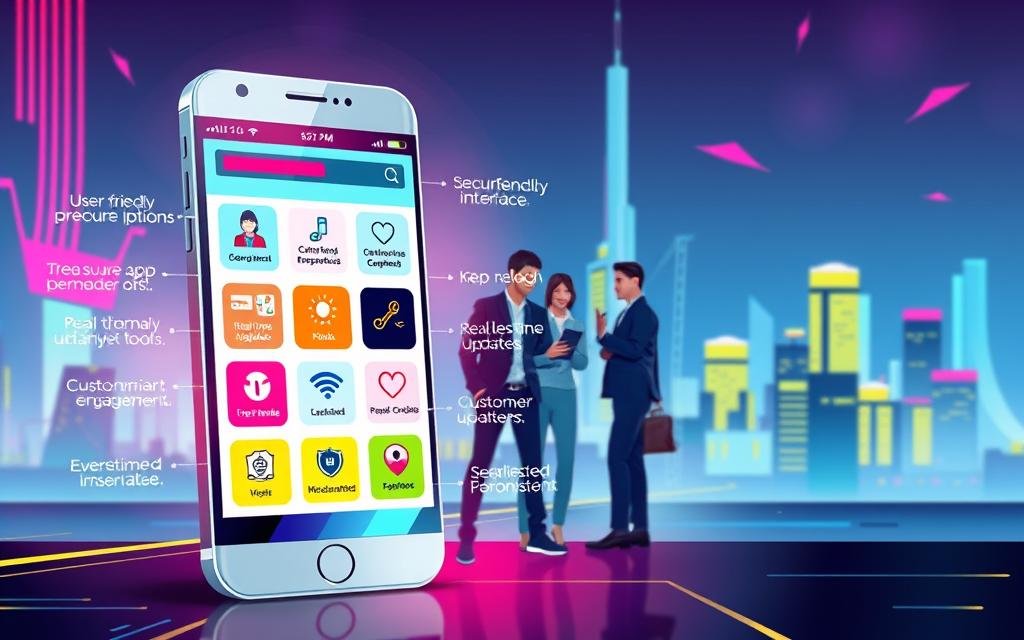In today’s digital landscape, businesses are constantly seeking innovative ways to enhance customer experience and streamline operations. Custom apps have emerged as essential tools for achieving these goals.
Unlike generic solutions, custom-built apps address specific business needs, providing tailored experiences that align with company objectives and customer expectations. By leveraging app technology, businesses can create new revenue streams, improve customer service, and gather valuable user information.
This comprehensive guide will explore the benefits and features of custom Mobile App development, helping you make informed decisions about implementing this technology in your business ecosystem.
Key Takeaways
- Custom apps enhance customer engagement and streamline business operations.
- Tailored experiences improve customer satisfaction and loyalty.
- Businesses can create new revenue streams through custom app development.
- Valuable user information can be gathered through custom apps.
- Custom Mobile App development supports business growth and competitiveness.
The Mobile App Revolution in Business
The mobile app landscape is transforming the way businesses operate and interact with customers. With millions of apps available, the impact on business operations is significant.
Current Mobile App Market Statistics
The mobile app market is vast, with over 3.5 million apps in the Google Play Store and 1.6 million in the Apple App Store. On average, a global user has 93 apps on their phone and uses 41 apps per month. This widespread adoption of mobile apps presents a significant opportunity for businesses to engage with their customers.
| Platform | Number of Apps |
|---|---|
| Google Play Store | 3.5 million |
| Apple App Store | 1.6 million |
How Mobile Apps Are Transforming Business Operations
Mobile apps are revolutionizing business operations in several key ways. They enable remote work, streamline communication, and facilitate real-time decision-making. Customer-facing operations are also enhanced through personalized experiences and simplified purchasing processes.
- Enhanced Internal Processes: Mobile apps improve internal business processes by enabling remote work and streamlining communication.
- Improved Customer Experience: Customer-facing operations are enhanced through personalized experiences and simplified purchasing processes.
- Data Collection and Analysis: Mobile apps provide businesses with valuable data on customer behavior and preferences.
By leveraging mobile apps, businesses can respond more quickly to market changes and customer needs, creating a competitive edge in their respective markets.
Key Benefits of Custom Mobile Apps for Your Business

The benefits of having a custom mobile app for your business are multifaceted, enhancing customer engagement and operational efficiency. A custom mobile app is tailored to meet the specific needs of your business and its customers, providing a unique experience that sets you apart from competitors.
Enhanced Customer Engagement and Loyalty
Custom mobile apps help businesses foster deeper connections with their customers. By providing a personalized experience, businesses can increase customer satisfaction and loyalty. Mobile apps allow for regular updates, promotions, and services that keep customers engaged.
Increased Brand Visibility and Recognition
A custom mobile app serves as a constant reminder of your brand, increasing visibility and recognition. With a dedicated app, your brand is just a tap away, making it easier for customers to interact with your business. This consistent presence helps build brand awareness and reinforces your business identity.
Direct Marketing Channel and Personalization
Mobile apps offer a direct marketing channel to your customers, enabling personalized communication and offers. By leveraging customer data, businesses can tailor their marketing efforts, increasing the effectiveness of their campaigns and driving sales.
Valuable Customer Data Collection and Analysis
Custom mobile apps generate valuable insights into customer behavior and preferences. By analyzing this data, businesses can make informed decisions, improve their offerings, and enhance customer satisfaction. The data collected through mobile apps can be instrumental in shaping business strategies and driving growth.
Some key benefits of custom mobile apps include:
– Mobile apps generate rich datasets about customer behavior, preferences, and usage patterns that can inform business strategy.
– Analytics tools integrated into custom apps provide actionable insights about user engagement, feature popularity, and conversion points.
– Customer feedback collected through apps offers direct input for product development, service improvements, and feature enhancements.
– Purchase history and browsing behavior data enable personalized recommendations and targeted offers that increase sales opportunities.
– Demographic information gathered through app registration helps businesses better understand their customer base and refine target audience definitions.
– Usage patterns reveal peak interaction times and preferred features, guiding resource allocation and development priorities.
Essential Features Your Business Mobile App Should Include

With the rise of mobile technology, businesses are now focusing on developing apps that cater to their customers’ needs. A well-designed mobile app can significantly enhance the user experience, driving engagement and loyalty.
User-Friendly Interface and Navigation
A user-friendly interface is crucial for the success of your business mobile app. It ensures that users can navigate through the app with ease, finding the information they need quickly. An intuitive design also reduces bounce rates and encourages users to explore more features.
Secure Payment Integration Options
For businesses that involve transactions, secure payment integration is a must-have feature. It not only protects sensitive customer information but also builds trust in your brand. By incorporating multiple payment gateways, you can cater to different user preferences, enhancing their overall experience on your app.
Push Notifications and Real-Time Updates
Push notifications are a powerful tool for keeping your customers engaged. They can be used to send personalized messages, updates, or reminders, ensuring that your app remains relevant in the users’ daily lives. By leveraging real-time updates, you can keep your users informed about the latest offers or changes, driving them back to your app.
Customer Support and Feedback Mechanisms
Providing excellent customer support is vital for resolving issues and improving user satisfaction. In-app support features, such as chat, email, or phone support, allow users to get assistance immediately. Additionally, feedback mechanisms help in gathering valuable insights, enabling you to make data-driven decisions to enhance your app‘s features and overall user experience.
By incorporating these essential features, businesses can develop a mobile app that not only meets but exceeds customer expectations, driving loyalty and ultimately contributing to the business’s success.
Step-by-Step Guide to Developing Your Custom Mobile App

Building a custom mobile app involves a series of strategic decisions and technical implementations. To ensure the success of your app, it’s crucial to follow a well-structured development process.
Defining Your App’s Purpose and Target Audience
The first step in developing your custom mobile app is to clearly define its purpose and identify your target audience. Understanding the needs and preferences of your users will help you design an app that meets their expectations and provides a seamless user experience.
Choosing Between Native, Cross-Platform, or Hybrid Development
When it comes to developing your mobile app, you have three primary options: native, cross-platform, or hybrid development. Native apps are built specifically for a single platform, such as iOS or Android, offering optimal performance and direct access to device hardware. Cross-platform development allows you to build apps that can run on multiple platforms using a single codebase, which can be more cost-effective and efficient.
Finding the Right Development Partner
Selecting the right development partner is crucial for the success of your mobile app. Look for a partner with experience in developing apps similar to yours, and consider their technical capabilities, design expertise, and customer support.
Testing and Quality Assurance Process
Thorough testing and quality assurance are vital to ensure your app is stable, secure, and provides a good user experience. This involves various types of testing, including functional, performance, and security testing, to identify and fix any issues before launch.
App Store Submission and Launch Strategy
Before submitting your app to the app stores, ensure you understand their guidelines and requirements to avoid rejection or delays. Creating a compelling app store listing with optimized descriptions, screenshots, and preview videos can improve visibility and download rates. Planning a phased rollout and preparing marketing materials can also help maximize your app’s impact upon launch.
By following these steps and considering factors like device compatibility and security, you can develop a successful custom mobile app that meets your business needs and delights your users.
Maximizing ROI from Your Mobile App Investment
Achieving a positive ROI from your mobile app investment demands a comprehensive strategy that aligns with your business objectives. To maximize the return on your mobile app, it’s essential to focus on strategic planning and continuous optimization. This involves measuring the right metrics to understand your app’s performance and identifying areas for improvement.
User acquisition and retention are crucial aspects of a successful mobile app strategy. While acquiring new users is important, retaining existing users is typically more cost-effective. A key metric to track is the user retention rate, which averages 25.3% on Day 1 and drops to 5.7% by Day 30 across 31 mobile app categories globally.
To enhance ROI, consider the following strategies:
- Implement effective monetization approaches that align with user expectations.
- Regularly update and enhance your app’s features to keep it relevant and valuable.
- Prioritize security and privacy to maintain user trust and protect your business reputation.
- Leverage user feedback and behavior data to drive continuous improvement.
- Integrate your app with other business systems and marketing channels to create synergies.
By adopting these strategies and staying informed about industry trends, you can maximize the ROI from your mobile app investment. Partnering with experienced professionals for ongoing maintenance and updates can further extend your app’s lifespan and business impact. With a well-planned approach, your mobile app can become a valuable asset, driving growth and revenue for your business on platforms like Google Play.
FAQ
What are the benefits of having a custom mobile app for my business?
A custom mobile app can enhance customer engagement, increase brand visibility, and provide a direct marketing channel. It also allows for valuable customer data collection and analysis, helping you make informed business decisions.
How do I choose the right development partner for my mobile app project?
To find the right development partner, consider their experience, portfolio, and security measures. Look for a partner who understands your business needs and has a proven track record of delivering successful apps.
What features should I include in my business mobile app?
Essential features include a user-friendly interface, secure payment integration, push notifications, and customer support mechanisms. These features will enhance the overall user experience and drive engagement.
How long does it take to develop a custom mobile app?
The development time varies depending on the complexity of the app, the development approach (native, cross-platform, or hybrid), and the resources available. On average, it can take several months to complete.
How do I ensure the security of my customers’ data in the mobile app?
To ensure data security, implement robust security measures, such as encryption, secure authentication, and regular security updates. It’s also crucial to choose a development partner who prioritizes security.
Can I update my mobile app after it’s launched?
Yes, you can update your app after launch. Regular updates can help fix issues, add new features, and improve overall performance. It’s essential to have a plan in place for ongoing maintenance and updates.
How do I measure the success of my mobile app?
To measure success, track key performance indicators (KPIs) such as download numbers, user engagement, and customer retention. Analyzing these metrics will help you understand your app’s impact and identify areas for improvement.
